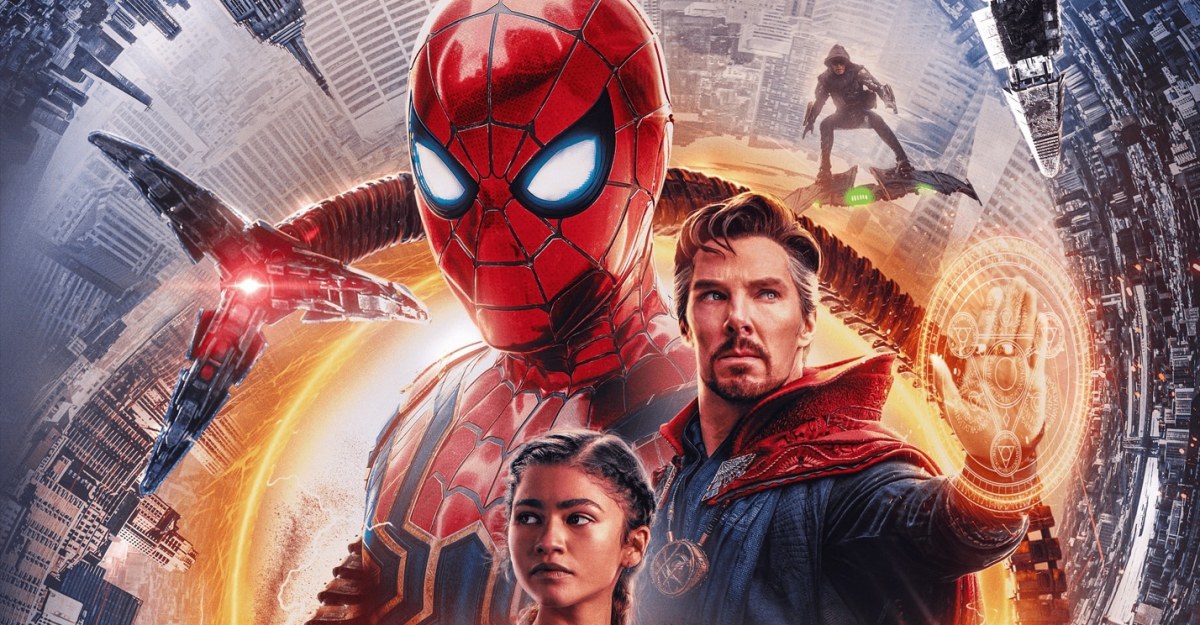Spider-Man: No Way Home is a bona fide hit of epic proportions. The results are staggering, especially considering the uptick in COVID-19 and the rapid spread of the omnicron variant. It had the third biggest opening ever with $600.8 million globally without opening in China; it landed the second biggest Monday ever with $37.1 million; it made up more than 90% of the box office income over its first weekend; it received overwhelmingly positive reviews from critics and fans; it was the first $1 billion global film since 2019; it is now the first release of the pandemic era to cross $300 million domestically. It is, in short, a cultural moment, and it’s going to save cinema, or at least it did for me.
This isn’t just talking about the box office. Spider-Man: No Way Home saved cinema for me personally. It brought back a joy in film I haven’t felt in years, even predating the pandemic. I am a film critic, but in the past two years I’ve lost the drive for watching movies. Obviously, this started without much choice as cinemas across the country shut down and my days became half work, half writing, half teacher, half parent, half quarantiner. That’s too many halves, and the thing that started dropping off was film. There just wasn’t enough mental space, especially for anything thought-provoking or serious, and so I just kind of slowly faded off.
This year, as cinemas reopened, I found myself still not all that jazzed about movies or returning to cinema, and not just because I was worried about bringing home COVID-19 to my then-unvaccinated six-year-old son. The few critic screenings I did attend, like No Time to Die, were enjoyable, but I wasn’t coming out of the theater feeling that excitement that movies use to make me feel. And that is saying a lot because I am a massive, massive, massive Bond fan. There’s still a stack of awards screeners I haven’t watched because I just wasn’t excited about them. I know these are nice problems to have, but for a film critic and lover of cinema, they are big problems.

Coming out of Spider-Man: Now Way Home, I felt excited again. Not just the excitement of seeing an exciting film with an audience, but the excitement of the magic of movies, for lack of a better term. I wanted to watch more movies. I wanted to talk about movies. I wanted to watch No Way Home again. It was a feeling I had lost through the stress and time loss of the pandemic, and it reminded me just how amazing film can be.
There are plenty of reasons Spider-Man: No Way Home brought this feeling out in me. Many of these reasons are also why it is such a hit with audiences and why experiencing it in theaters is what so many people have gone out and done. Yes, No Way Home is a good movie, but it is also the perfect film in the moment.
To begin with the obvious, it is a Marvel film that inherently pulls in audiences, but that is something special. That shared continuity — myth-making, if you will — is part of our global zeitgeist. With so much media out there to consume, entertainment is drifting into more and more niche sections, meaning fewer and fewer shows and films are actual cultural moments. The Marvel Cinematic Universe (MCU) is one of the few that continues to reverberate. We love the story that is the MCU, and we’re showing up for our favorite parts. The fact that Spider-Man: No Way Home is both an integral and good part of this story makes it a cultural touchpoint that connects the masses.

Of course, No Way Home isn’t just playing on the MCU itself. It’s playing with nostalgia, that magical bit of psychological fun that makes us yearn for a “better” past and the things we fell in love with as kids. Nostalgia is a tricky thing, though. It can backfire dramatically and come across as crass and out of touch. Nostalgia is its own sort of cultural touchpoint, and if you mess with it the wrong way, it can burn.
That’s why No Way Home‘s somehow masterful use of nostalgia makes you remember not the corporate overlords that control everything but instead actually pulls you back into the stories you loved. The return of all these villains and both previous Spideys in such a surprisingly effective way gave people the nostalgia they wanted in a way that didn’t feel forced. That’s powerful. For someone like me who hadn’t connected with movies for a while, it brought back a lot of what made me love them and, also, plenty of childhood glee. Whether that was done to suck my wallet dry or out of love doesn’t really matter; it worked. Its connection to the past brought us all something extra.
Spider-Man: No Way Home is not a perfect film, though it is exceptionally well done. I’d argue that Shang-Chi has better action and that director Jon Watts can get his action lost a bit, especially with three somewhat same-looking Spider-Men running around. The multiverse-creating storyline is pretty key to the MCU, as discussed before, but isn’t so special as to make one fall in love with the movie. Rather, as in all the best Marvel films, it is the characters that elevate a good MCU movie into something that makes you leave the theater with a massive smile on your face.

The trio of Peter, MJ, and Ned stand out in the MCU, and it’s in their unique characters and relationships where the power, the magic, of cinema lies. The powerhouse of a death in the film, the awkward teen romance, the different Spideys’ struggles — it’s how No Way Home becomes more and brings us all back into cinema. These types of moments have honestly been missing lately from the movies that are actually receiving a major theatrical release.
But in the end, Spider-Man: No Way Home is just damn fun to watch. The callbacks, the call-forwards, the jokes, the multiverse, the action. Sad moments aside, it all works to make a movie that puts a smile on your face from beginning to end. It also helps that the film concludes in what can only be described as a nostalgic comfort moment: Spider-Man, the familiar broke kid in a blue-and-red, homemade costume, is back.
So, Spidey is here to save cinema, right? Or maybe destroy it. That’s a hard swing in the other direction, but it could be true. The challenge is that this is pretty much impossible to replicate. If all it took were nostalgia, then West Side Story wouldn’t have flopped. The MCU has done well during the pandemic with Black Widow and Shang-Chi, but not this well — not cinematic experience-saving well. They didn’t impact the cultural zeitgeist in this way. They didn’t pull us in to the same degree for a shared moment. Films like that are few and far between, but at the moment, Hollywood and cinema need a lot of them. It’s going to be hard to get people back into seats, even when the latest COVID wave abates, and it’s going to take movies like Spider-Man: No Way Home that can remind us why movies are awesome.






Published: Jan 5, 2022 11:00 am